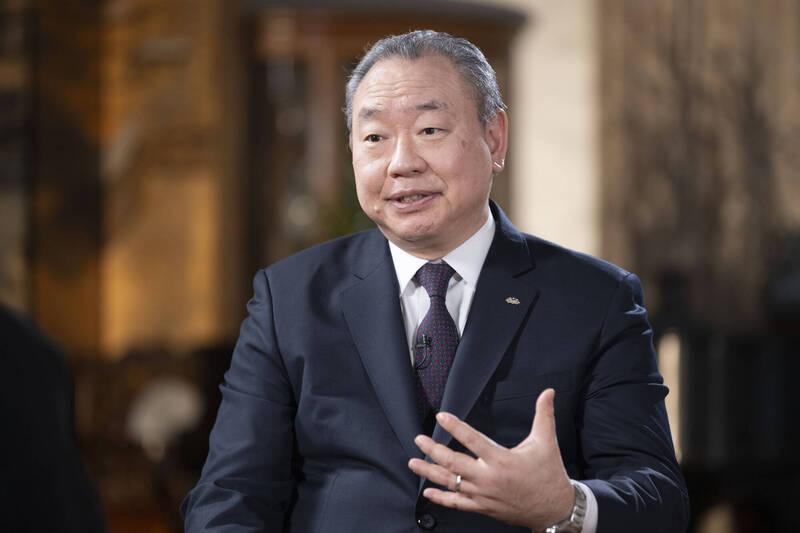Taiwan is not freeloading off the US for its defense against China and that it is taking collaborative steps to bolster its security, Representative to the US Alexander Yui (俞大㵢) said yesterday.
“We’re not freeloaders, free-riders — we’re not just expecting to be saved,” Yui said in an interview yesterday in Washington.

Photo: AP
“Peace through strength is something we embrace,” he added, citing one of US President Donald Trump’s favorite foreign policy taglines.
Yui said Taiwan is in constant discussions with US officials about which US-made weapons it can buy that are best-suited to “asymmetric” warfare against a bigger foe.
Taiwanese officials are also speaking with Silicon Valley defense tech startups, he said.
At the same time, the government in Taipei is “revamping” its military reserves and civil defense preparations, while ensuring its energy grid and food supply can survive any Chinese effort to isolate it, he said.
The comments come as Trump is spurring doubts over US global commitments since returning to the White House.
He is cutting foreign assistance, pushing allies to spend more on their own security and pressuring Ukraine to make concessions to Russia, which invaded it three years ago.
Taiwan is seeking to stay on the right side of Trump, who has questioned the logic of the US' commitment to the security of Taiwan.
The US president has accused Taiwan of taking away the US semiconductor industry.
Bloomberg Economics estimated last year that a war over Taiwan would cost the global economy about US$10 trillion, with the loss of semiconductor manufacturing cascading through global supply chains and markets.
The US president said on the campaign trail that Taiwan should pay the US for its defense, and recently said Taipei should increase its military spending to 10 percent of GDP.
President William Lai (賴清德) last month ruled out such a steep increase, which would put its relative spending far above that of the US and other NATO members, proposing instead a more modest rise to about 3 percent of GDP from about 2.45 percent.
“We’re doing what we can,” Yui said.
He also pitched Taiwan as an “indispensable partner” for Trump’s efforts to revive US manufacturing, with Taiwanese tech firms boosting investment amid threats of tariffs.
Chipmaking behemoth Taiwan Semiconductor Manufacturing Co this month unveiled a new US$100 billion investment in the US — announced at the White House by chief executive officer C.C. Wei (魏哲家) alongside Trump — a deal so big that it spurred criticism the firm was abandoning its home.
The company rejected the allegation, which is particularly sensitive in Taiwan given the “Silicon Shield” theory that Taiwan’s dominant position in the global semiconductor supply chain deters Chinese aggression.
Asked whether Trump’s tariff threats have spurred Taiwan’s investments, Yui acknowledged Washington’s “carrot-and-stick” approach.
He said legislation addressing the double-taxation of Taiwanese firms in the US, which has overwhelmingly passed the House of Representatives, would act as a big incentive for pouring further funds into the US.
Yui said he was “confident” it would clear the Senate and hoped it would be signed into law this year.
“I would rather have the carrot than the stick,” he said.

DEFENSE: The National Security Bureau promised to expand communication and intelligence cooperation with global partners and enhance its strategic analytical skills China has not only increased military exercises and “gray zone” tactics against Taiwan this year, but also continues to recruit military personnel for espionage, the National Security Bureau (NSB) said yesterday in a report to the Legislative Yuan. The bureau submitted the report ahead of NSB Director-General Tsai Ming-yen’s (蔡明彥) appearance before the Foreign and National Defense Committee today. Last year, the Chinese People’s Liberation Army (PLA) conducted “Joint Sword-2024A and B” military exercises targeting Taiwan and carried out 40 combat readiness patrols, the bureau said. In addition, Chinese military aircraft entered Taiwan’s airspace 3,070 times last year, up about

A magnitude 4.3 earthquake struck eastern Taiwan's Hualien County at 8:31am today, according to the Central Weather Administration (CWA). The epicenter of the temblor was located in Hualien County, about 70.3 kilometers south southwest of Hualien County Hall, at a depth of 23.2km, according to the administration. There were no immediate reports of damage resulting from the quake. The earthquake's intensity, which gauges the actual effect of a temblor, was highest in Taitung County, where it measured 3 on Taiwan's 7-tier intensity scale. The quake also measured an intensity of 2 in Hualien and Nantou counties, the CWA said.

The Overseas Community Affairs Council (OCAC) yesterday announced a fundraising campaign to support survivors of the magnitude 7.7 earthquake that struck Myanmar on March 28, with two prayer events scheduled in Taipei and Taichung later this week. “While initial rescue operations have concluded [in Myanmar], many survivors are now facing increasingly difficult living conditions,” OCAC Minister Hsu Chia-ching (徐佳青) told a news conference in Taipei. The fundraising campaign, which runs through May 31, is focused on supporting the reconstruction of damaged overseas compatriot schools, assisting students from Myanmar in Taiwan, and providing essential items, such as drinking water, food and medical supplies,

New Party Deputy Secretary-General You Chih-pin (游智彬) this morning went to the National Immigration Agency (NIA) to “turn himself in” after being notified that he had failed to provide proof of having renounced his Chinese household registration. He was one of more than 10,000 naturalized Taiwanese citizens from China who were informed by the NIA that their Taiwanese citizenship might be revoked if they fail to provide the proof in three months, people familiar with the matter said. You said he has proof that he had renounced his Chinese household registration and demanded the NIA provide proof that he still had Chinese